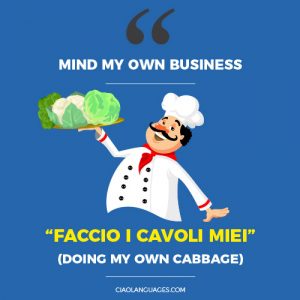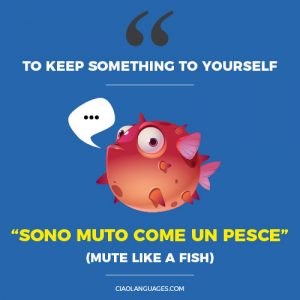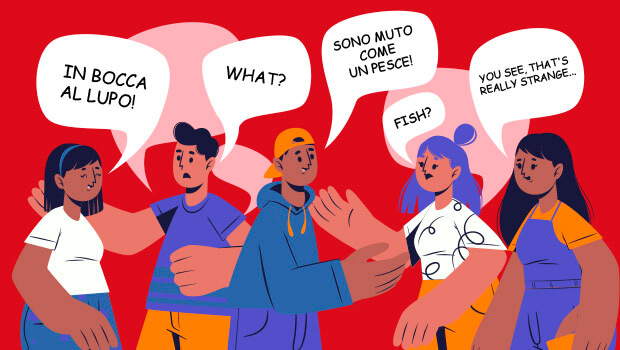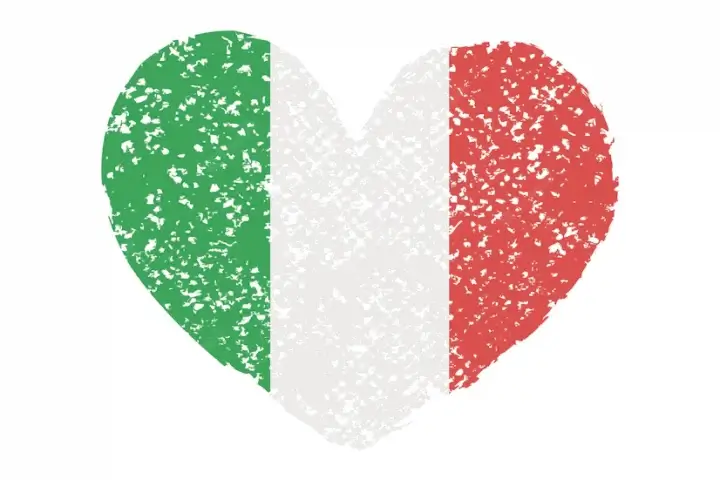Some really funny, interesting and cool Italian expressions
Here is a list of some really useful Italian expressions that you’ll need for your trip to Italy
First, let’s look at some of the more common and easy expressions:
“In bocca al lupo” (Good luck!): This expression literally translates as “In the mouth of the wolf.” Basically, it’s the Italian’s way of saying “Good luck.” But since it’s a bad luck to say good luck, you don’t say “Good luck,” but something completely different! That probably does not make a ton of sense, but think about how in English we say “Break a leg” to say good luck!
Here’s a sample conversation in Italian.
Andrea: Che ansia! Ho un esame domattina. (I’m so nervous, I have an exam tomorrow morning)
Silvia: In bocca al lupo! (“In the mouth of the wolf” or “In the wolf’s mouth” – Good luck!)
Andrea: Crepi il lupo! (“May the wolf die”).
In conclusion, to say good luck in Italian, don’t say “good luck”!
“Cin-cin” (Cheers!): This is what you say when you clink glasse with friends, acquaintances or loved ones. The sound of the expression cin-cin (pronounced “CHEEN – CHEEN”) is probably a bit of onomatopeia for the sound of clinking glasses.
“Fare il footing” (Go jogging): Italians have a knack for incorporating English words into Italian. Spend any time with a Milanese businessperson and you’ll hear a bunch of Italian sprinkled with training, team-building and meeting. What’s interesting in this case is the way “footing” takes on a completely different meaning in Italian. Whereas in English the word “footing” refers to the purchase of your foot on a surface, e.g., “His footing is solid”, in Italian “footing” refers to the physical activity of jogging.
Another example of this phenomenon is the way in which Italians refer to “remote working” as “Smart-working,” presumably because the work is carried out using “smart technologies”, eg cell phone, video-conferencing, cloud storage, etc.
“Basta!” (Enough!) – If you spend any amount of time around Italians, you will hear this word, which means “enough.” “Basta!” can be yelled at the top of the lungs by an exasperated parent; or said politely but firmly to your dinner host when they try to put more food into your dish. In a restaurant, when the waiter asks you if you would like to order anything else, you can say, “Basta così, grazie” (That’s enough, thanks).
But, I’ve gone on enough about this. Basta!
“Mi raccomando” (Untranslateable!!) – “Mi raccomando” is one of the most versatile Italian expressions there is. To explain it would require an entire post of its own.
For now, though, we will limit ourselves to just one of its meanings.
Here it is. Saying “Mi raccomando” is like saying “Keep your eyes peeled for potentially dangerous situations, stay on the straight and narrow path, don’t do anything embarassing and behave well. If you do not do all of these things, I will beat you over the head with my wooden spoon.”
As your son walks out of the door to go out with his friends you say, “Mi raccomando…” and the air is immediately permeated with parental concern, watchfulness and hope. “Sì, Mamma…” comes the sighed reply.
 “Bella figura“/”Brutta figura” (“Beautiful figure”/”Ugly figure”): “Figura” is linked to the idea of appearances. Italians place value on proceeding smoothly through life and doing the correct things at the correct moment. You’re invited to dinner, you bring a bottle of wine or a dessert. You show up for a meeting, and your presentation slide deck is flawless, contains no spelling errors or images with “stock photo” written on them. You smile at your dinner date and there is no parsley between your teeth.
“Bella figura“/”Brutta figura” (“Beautiful figure”/”Ugly figure”): “Figura” is linked to the idea of appearances. Italians place value on proceeding smoothly through life and doing the correct things at the correct moment. You’re invited to dinner, you bring a bottle of wine or a dessert. You show up for a meeting, and your presentation slide deck is flawless, contains no spelling errors or images with “stock photo” written on them. You smile at your dinner date and there is no parsley between your teeth.
When you swim through life, hit all of the right notes in a conversation, dress appropriately for each situation, do a great job at work without appearing to sweat it, you make a “bella figura,” just like an ice-skaterwho pulls off a triple axle and sticks the landing with a flourish.
But there are those moments in life, we all have them, in which you plod gracelessly through life. Show up for work in slightly mismatched socks, put your foot in your mouth in a conversation, space out in a meeting, spill coffee on your lap. In this case, you did a “brutta figura” – you did what you had to do but you did not do it with grace or penache.
I hope it does not sound like I’m saying Italians are superficial because the opposite is true. Italians value substance. One of the highest compliments you can receive in Italy is to be called a “Una persona seria.” (A serious person).
I think that the “bella figura” expression goes a lot to showing how important substance is. Think about it. If you are serious about work, you double- and triple-check your presentation to make sure there are no silly mistakes. When having a conversation with someone, you are aware of their circumstances and take care to say the right things and to avoid potentially sensitive topics. That’s why “brutta figura” is so deeply mortifying for Italians – it belies a lack of care and seriousness. Italians care and want it to show.
This has been a list of more common expressions in Italian, but now let’s looks smore more advanced Italian idioms. Some of these are kind of funny.
“Essere in gamba” (“To be smart/good/serious/squared away”): Literally translated as “to be in leg,” this is a very versatile expression, which has many different connotations. Typically, it is meant to indicate that someone is not only good at her job, but is also incredibly helpful, insightful and honest. “I’m giving you the number of my personal lawyer. E’ un tipo in gamba. He’ll help you out.” Usually, it is translated as “smart,” but it is a lot more complete than that. A person who is in gamba is not only smart but reliable , hardworking and helpful. I think the implication is that the person would definitely go the extra mile.
“Fare cavoli miei” (Mind my own business): What’s funny about this is how somehow “Doing my own cabbages” means keeping your nose out other people’s business. Maybe it has some agricultural origin. In the old days did nosy neighbors eagerly dispense advice on cabbage growing? Or, was it that while other farmers were gabbing about nothing and everything, the discrete person kept his on his cabbages and didn’t participate in the conversation?
“Rompere le scatole” (To greatly annoy someone): Literally translates “break boxes,” as in “Hey, cut it out, you’re breaking my boxes!”
“Essere muto come un pesce” (To keep something to yourself): If you think about it, it makes sense. A fish is mute and if you are “Mute like a fish,” you are not apt to spread gossip.
“Essere al verde” (To be broke): “To be in the green” means the opposite of what you might think. It means you’ve got no money.
“Mi è passata la voglia” (“I don’t feel like it anymore”): I think this is a funny expression because it literally meanss “The desire has passed.” I imagine a train that just blows by a station. “A Streetcar Named Desire” in Italian would be a play that no one would feel like watching!
This conludes our article about Italian idiomatic expressions. It’s a lot of information to digest and more importantly, to practice. If you think you would like to practice a bit before you go to Italy, contact us for live online Italian lessons with a native speaker of Italian. You’ll get a chance to take your Italian for a test run and that way be even more prepared. Remember that even just a bit of the language goes a long way to opening the way to the understanding a new culture. Your host country will be happy that you are trying to learn its language, too. Bravo!
Ciao Languages is based in Orange County, California and puts you in touch with languages from all over the world, from the convenience of your home! We are an online school, but we firmly believe in the motto “Making the Virtual Human.”
Quote Request
Contact us immediately for a quote.




